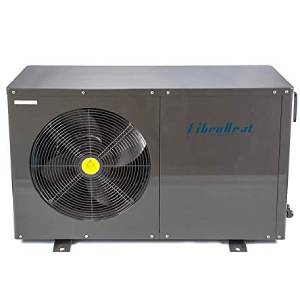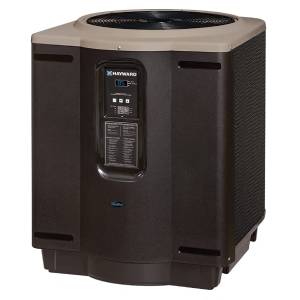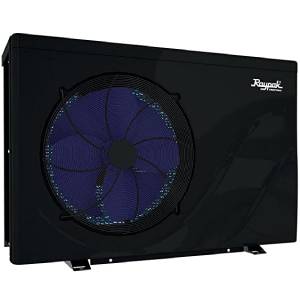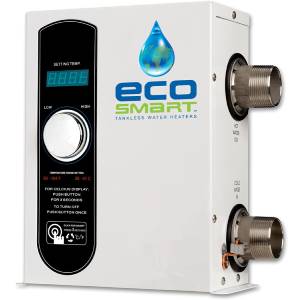- Salt Water Pool and Spa
- Inground Pool Heaters
- Electric Pool Heaters
Electric Pool Heaters
An electric pool heater will keep your pool warm all season long using electrical resistance that transforms heat from an element to your pool water as it passes through it. They are best suited for small pools, above ground pools or hot tubs and have limitations when it comes to heating ability and efficiency. If you are in the market for an energy efficient heater capable of heating large pools we recommend taking a look at pool heat pumps.
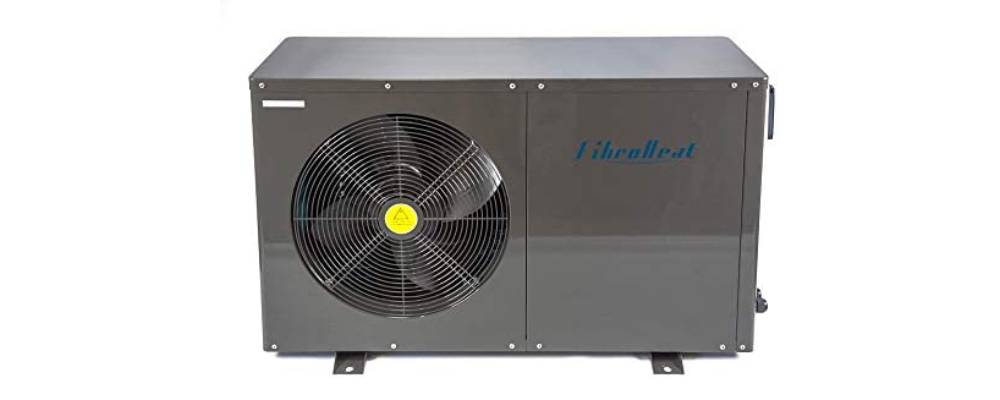
Electric swimming pool heaters aren't known for their energy efficiency but they make up for it by being very easy to install, set up and operate. Their compact design makes them ideal for pool areas with limited space and provides a neat appearance. All they require is an electrical source with a slight modification to the main circuit breaker. An electric pool heater operates on electrical power and might be your only option if you live where there is no natural gas lines or a large propane tank won't fit.
How an Electric Pool Heater Works
An electric pool heater uses electricity to heat up the water in a swimming pool as it's circulated through the plumbing system via the pump and filter assembly. It consists of an electric heating element that is powered by electricity, and a thermostat that controls the water temperature. When the pool pump is turned on, water is drawn into the heater and passes over the heating element. The heating element heats up the water as it passes through, and then the heated water is returned to the pool. A thermostat monitors the water temperature and turns the heating element on or off as often as needed.
The simplicity of how an electric pool heater works make it an attractive option for some pool owners. They are typically less expensive to purchase than gas or propane heaters, but they can be more expensive to operate unless unless you utilize the latest pool heat pump heater technology.
Best Electric Pool Heaters
The best electric heaters on the market today are as energy efficient as it gets. The reason is because they are historically knows as being very expensive to operate. In an attempt to make them appealing to consumers they've come up with technology in recent years that delivers efficiency as high as 99.8%. As a general rule you should only consider electric heaters for small pools and spas as they can be very expensive to heat.
FibroPool Electric Pool Heater
The FibroPool electric pool heater is a compact and energy-efficient option for heating above-ground and small in-ground pools. It has a digital control panel that allows you to set the desired temperature and a safety shutdown feature to prevent overheating. The heater can operate on 120V or 240V power and is equipped with a flow switch that ensures the unit only operates when water is flowing. It has a stainless steel heating element and housing that resists rust and corrosion making it ideal for salt water pools. It's easy to install and operate, making it a convenient and reliable heating solution for your pool.
FibroPool High Efficiency All Electric Pool HeaterIf you click on this link and make a purchase, we may earn a commission. |
Hayward Electric Pool Heater
The Hayward electric pool heater is arguably the best all electric pool heater for large inground pools on the market. It has the ability to heat almost any size residential pool and if you live in a mild climate you can count on incredible efficiency. The latest in heat pump technology utilizes energy from the ambient air to transfer heat energy to the pool water so it returns warmer than when it came out of the pool. Add in a corrosion-resistant evaporator fir, heavy-duty, durable casing, stainless steel hardware and you've got a top of the line electric pool heater.
Hayward All Electric Pool Heater for Large PoolsIf you click on this link and make a purchase, we may earn a commission. |
Raypak Electric Pool Heater
Raypak manufactures a range of electric pool heaters designed for inground and above ground pools. They have a compact design, are energy-efficient and cost-effective to operate if you own a small inground pool or above ground pool. They feature a diagnostic system that monitors the heater's performance and alerts the user to any potential problems. They are compatible with most automated pool systems, allowing users to control their pool's temperature remotely using a smartphone or other mobile device.
Raypak Electric Heater for Small Pool and SpasIf you click on this link and make a purchase, we may earn a commission. |
EcoSmart Electric Pool Heater
The EcoSmart electric pool and spa heater is a great option for heating small pools. They are ideal if you don't want to use or don't have access to natural gas or propane. The upfront cost for a fully electronic unit is a lot lower than other types of heaters but can be costly to operate in colder climates that require a substantial amount of heating.
EcoSmart Electric Pool and Spa Heater for Small PoolsIf you click on this link and make a purchase, we may earn a commission. |
Electric Pool Heater Advantages and Disadvantages
The advantages that electric pool heaters bring to the table include the fact that they only use electricity which almost all pool owners have access to. Whether a personal choice because you don't want to use fossil fuels like propane or natural gas, or you simply don't have easy access to those fuel sources, electrical pool heaters are easy to install and simple to operate. There are units designed for small pools and units that utilize heat pump technology for large pools.
Electric Pool Heater Advantages
- Quick heating making them ideal for pool owners that want to use their pool on short notice.
- Easy to install and don't require any plumbing of gas lines or venting systems.
- Energy efficient compared to gas pool heaters, and they don't lose heat through exhaust gases.
- Low maintenance and don't have many moving parts that require cleaning.
Electric Pool Heater Disadvantages
- High operating costs; more efficient than gas heaters but not as efficient as solar pool heaters.
- Limited heating capacity; not as powerful as gas pool heaters and are better suited for small pools.
- Dependent on electrical supply including a reliable and constant source to operate, which can be a problem in areas with frequent power outages.
Electric Pool Heater vs Gas Pool Heater
Electric and gas pool heaters are both designed to provide "on demand" heat. They are great for providing quick heat similar to a furnace in a house, but aren't very efficient or cost effective if you require constant heat. A gas heater will heat slightly faster than an electric pool heater under similar conditions. The cost to operate both types are very similar depending on your local rates, whereas a heat pump heater is substantially cheaper to operate.
- Cost: Electric heaters are generally less expensive to purchase than gas pool heaters, but they tend to be more expensive to operate in the long term.
- Efficiency: Gas pool heaters tend to be more efficient than electric pool heaters, meaning they can heat the water more quickly and with less energy usage.
- Installation: Gas pool heaters typically require professional installation and may require a gas line to be installed, while electric pool heaters can be easier to install and simply require access to an electrical outlet.
- Environmental impact: Gas heaters produce emissions that can contribute to air pollution, while electric pool heaters are considered to be more environmentally friendly.
Electric Pool Heater vs Pool Heat Pump
Electric pool heaters and pool heat pumps are both powered by electricity but that is where the similarity ends. An electric pool heater generates heat energy from the electrical resistance inside the heater coil, and a pool heat pump converts heat energy from the surrounding air. A pool heat pump will operate most efficiently in warm weather and can cost up to 85% less than electric resistance heaters. The only conditions where an electric heater will outperform a heat pump heater is when air temperatures drop below 50℉ or 10℃.
- Cost: Electric pool heaters are generally less expensive to purchase than pool heat pump heaters. However, pool heat pump heaters are more efficient and cost less to operate in the long term.
- Efficiency: Pool heat pump heaters are more energy-efficient than electric pool heaters and can produce up to five times more energy than they consume. This means that while they may be more expensive upfront, they will save you money on energy bills in the long run.
- Installation: Pool heat pump heaters typically require professional installation and may require additional electrical work, while electric pool heaters can be easier to install and simply require access to an electrical outlet.
- Environmental impact: Both electric pool heaters and pool heat pump heaters are considered to be more environmentally friendly than gas pool heaters since they do not produce emissions. However, pool heat pump heaters are more energy-efficient and produce less greenhouse gas emissions than electric pool heaters.
Electric Pool Heater Cost
Electric pool heater cost is comparable to gas heaters in all areas except it might cost more to have an electric heater installed because of the higher electrical current requirements. The increased electrical current demands often means you need to make alterations to your electrical supply panel as well as wiring upgrades. You can count on spending $1,000 to $3,000 on a standard electric heater, including installation fees.
It's worth noting that while electric pool heaters are generally less expensive to purchase than gas pool heaters or heat pump pool heaters, they tend to have higher operating costs in the long run due to their lower energy efficiency. This means that the cost of operating an electric heater over time can outweigh the initial cost savings of purchasing one. Additionally, the cost of electricity in your area can also impact the overall cost of running an electric unit.
Electric Pool Heater Sizing Guide
Electric pool heater sizing is really simple and takes into consideration the time to heat your pool based on water volume and size of the heater. A properly sized electric pool heater will raise water temperature 1℉ to 1.5℉ every hour under ideal weather conditions. The time to heat will vary with fluctuating air temperature, pool usage, wind and if a cover is being used or not.
The manufacturer will have sizing information including a sizing calculator where all you need to do is input the volume of your pool to determine heating speeds. You can then make an informed decision based on budget and the time to heat speed that you want.
Electric Pool Heater Installation
- Determine the location: Choose a location for the heater that is close to the pool pump and filter, and has access to a dedicated electrical circuit.
- Electrical wiring: Hire a licensed electrician to install a dedicated circuit for the heater, which will require a separate circuit breaker.
- Mounting the heater: The heater can be mounted on a flat surface near the pool pump and filter.
- Plumbing: Connect the inlet and outlet pipes from the heater to the pool pump and filter.
- Control wiring: Connect the control wiring to the pool pump and filter to ensure the heater turns on and off properly.
- Commissioning: Fill the pool with water and test the heater to ensure it is working properly.
It is important to note that installation requirements and costs may vary depending on the specific model and brand of heater, as well as the location of the installation. It is recommended to hire a professional installer or licensed electrician to ensure the heater is installed correctly and safely.
Electric Pool Heater FAQs
Can an electric pool heater be used in a salt water pool?
Can an electric pool heater be used in a salt water pool?
Yes, a salt water pool can be heated by any type of heater; electricity, gas or solar. All internal parts are made with anti-corrosion metal that will resist corrosion from salt and other pool chemicals.
How much does it cost to operate an electric pool heater?
How much does it cost to operate an electric pool heater?
Electric heaters cost between $150 to $600 per month to operate, compared to electric heat pump heaters that cost anywhere between $100 to $300 per month.
How long does it take to heat a pool with an electric pool heater?
How long does it take to heat a pool with an electric pool heater?
A typical residential pool will take about 10 hours to increase the temperature of the water by 10˚F but this varies depending on pool volume, ambient air temperature and heater type.
How much does an electric pool heater cost to install?
How much does an electric pool heater cost to install?
A basic electric pool heater can be installed by a handy pool owner while an electric heat pump pool heater will likely require the installation of an electrical circuit that will cost from $500 to $2,000 including professional labour.
Are electric pool heaters environmentally friendly?
Are electric pool heaters environmentally friendly?
Electric heaters are considered eco-friendly and don't emit any harmful emissions like gas and natural gas heaters.
How long does an electric pool heater typically last?
How long does an electric pool heater typically last?
An electric heater should last 10 or more years with proper installation, maintenance including balanced pool water chemistry.
How do I properly maintain my electric pool heater?
How do I properly maintain my electric pool heater?
The heater should be installed in a place where it will be kept elevated and dry at all times, including sprinklers. Keep the heater clean and free of debris including leaves. The heater should also be kept on a routine schedule with no long periods of downtime or extended usage times.
Disclaimer
Please use all appropriate and proper safety precautions when attempting projects on this website. All projects are attempted at the reader's own risk.
Salt Water Pool and Spa™ participates in the Amazon Services LLC Associates Program, as an Amazon Associate we may earn a commission from qualifying purchases.
